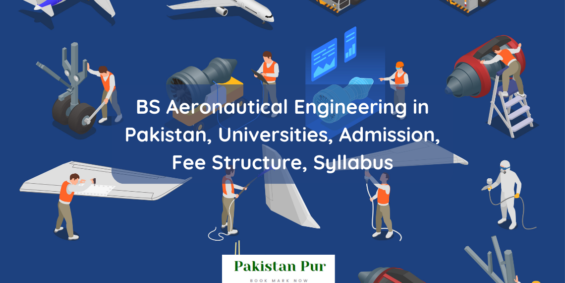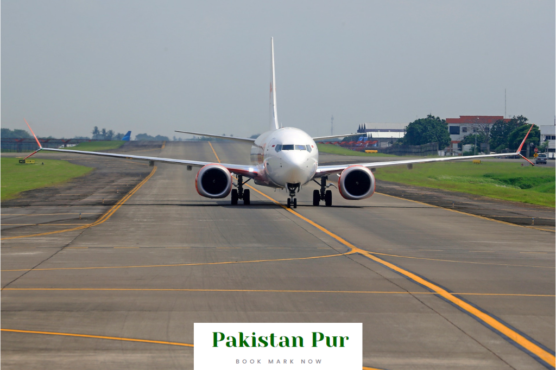
Table of Contents
Aeronautical Engineering is a specialized branch of engineering that involves the design, development, testing, and production of aircraft and related systems.
BS Aeronautical Engineering in Pakistan is a renowned and sought-after degree in Pakistan, offered by several prestigious institutions. The degree program provides students with the technical foundation necessary to excel in the field of Aeronautics & Astronautics.
Some of the prominent universities offering this course include the Institute Of Space Technology, Islamabad, and the College of Aeronautical Engineering (CAE). These institutions are renowned for their rigorous academic curriculum and extensive practical training.
The BS Aeronautical Engineering program typically spans over 4 years, providing students with an in-depth understanding of design, development, testing, and production of aircraft and related systems.
This degree is recognized by the Ministry of Education and the Pakistan Engineering Council.A BS in Aeronautical Engineering in Pakistan offers a comprehensive education in the field, preparing graduates for an exciting career in the aerospace industry.
This Guide to BS Aeronautical Engineering in Pakistan is a part of the series on the best degrees after FSc Pre Engineering. Read the full list of degrees here.
Best Fields after FSc Pre Engineering in Pakistan
BS Aeronautical Engineering Universities in Pakistan
Here is a table of aeronautical engineering universities in Pakistan. Use the search function to find universities of aeronautical engineering in Pakistan and in your city.
| Institution | City | Program | Public/Private |
|---|---|---|---|
| Institute Of Space Technology | Islamabad | BS , 4 Years | Public |
| College Of Aeronautical Engineering | Risalpur | BE , 4 Years | Public |
| Aeroline Institute Of Aviation Studies | Lahore | BS , 4 Years | Public |

Aeronautical Engineering Subjects in Pakistan
Here is a list of the major subjects in the BS Aeronautical Engineering syllabus in Pakistan:
- Physics
- Chemistry
- Mathematics
- English Composition
- Pakistan Studies
- Calculus
- Thermodynamics
- Aviation Meteorology
- Aircraft Electrical System
- Aircraft Landing Gear
These subjects collectively form a robust curriculum, providing a comprehensive understanding of Aeronautical Engineering.
BS Aeronautical Engineering Syllabus HEC
The Higher Education Commission of Pakistan developed BS Aeronautical Engineering syllabus with input from the Pakistan Engineering Council.
You can read aeronautical engineering syllabus pdf here.
BS Aeronautical Engineering: Semester 1 Subjects
- English-I
- Math-I
- General Physics
- Pakistan Studies
- Workshop Technology
- Islamic Studies
- Introduction to Aerospace Engg
BS Aeronautical Engineering: Semester 2 Subjects
- English-II
- Engineering Mechanics-I (Statics)
- Math-II
- Chemistry
- Engineering Drawing
- IDEE-I
BS Aeronautical Engineering: Semester 3 Subjects
- Incompressible Aerodynamics
- Intro to Comp Programming
- Math-III
- Material Science
- Thermodynamics-I
- Probability and Statistics
BS Aeronautical Engineering: Semester 4 Subjects
- Engineering Mechanics-II (Dynamics)
- Compressible Aerodynamics
- Mechanics of materials
- Aerospace Instrumentation
- Natural Sciences/Elective-II
BS Aeronautical Engineering: Semester 5 Subjects
- Numerical Methods
- Aerospace Structure-I
- Control System
- Heat Transfer
- Aero Vehicle Performance
- Social Science I
BS Aeronautical Engineering: Semester 6 Subjects
- Structural Dyna & Aero elasticity
- English-III
- Stability & Control
- Aerothermodynamics (Propulsion)
- Engineering Management
BS Aeronautical Engineering: Semester 7 Subjects
- Aero Vehicle Design
- Structures Elective
- Engineering Elective
- Social Sciences-II
- Computer App in Engg. Design
BS Aeronautical Engineering: Semester 8 Subjects
- Senior Design Project
- Professional Practice
- IDEE-II
Read this guide to understand the scope and salary of BS Aeronautical Engineering graduates in Pakistan.
BS Aeronautical Engineering Scope In Pakistan

Eligibility Criteria For Aeronautical Engineering In Pakistan
Admission into a BS Aeronautical Engineering program in Pakistan requires specific academic qualifications. The eligibility criteria vary slightly depending on the institution, but there are some common prerequisites.
Academic Qualifications
Applicants must have a strong foundation in science and mathematics. Typically, they should have completed FSC Pre-engineering (including Chemistry), or A-Level with math, biology, and physics. A minimum score of 60% to 70% is often required in these subjects.
Some institutions also accept candidates who have a diploma in Aeronautics or an undergraduate degree in related fields such as Aerospace, Mechatronics, Mechanical, or Chemical Engineering.
Entrance Exams
In addition to academic qualifications, some universities require candidates to pass an entrance exam. For example, AU-GAT(Gen) with at least 60% score is required by some institutions.
Other Requirements
While academic achievements are crucial, applicants’ interest and commitment to the field of aeronautical engineering are also considered. They may need to submit personal statements or letters of recommendation, participate in interviews, or meet other requirements set by individual institutions.
The admission process can be competitive given the limited number of seats available in these programs. Therefore, prospective students are advised to thoroughly understand the eligibility criteria and prepare accordingly.
Aeronautical Engineering Fees In Pakistan
| Institution | Admission Fee | 1st Semester Fee | Subsequent Semester Fee | Total Program Fee |
| Institute Of Space Technology | Rs. 35,000 | Rs. 183,235 | Rs. 134,235 | Rs. 11,22,880 |
Aeronautical Engineering Universities In Pakistan Lahore
Only one institute is offering BS aeronautical engineering in Lahore.
- Aeroline Institute Of Aviation Studies
Aeronautical Engineering Universities In Karachi
Currently, no university is offering BS aeronautical engineering in Karachi. However, the Karachi Institute of Economics and Technology offers BS Avionics.
Aeronautical Engineering Universities in Islamabad
These universities are offering BS Aeronautical engineering in Islamabad and Rawalpindi.
- Institute Of Space Technology
- College Of Aeronautical Engineering
What Is The Difference Between Aircraft Engineering And Aeronautical Engineering?
Here is a short comparative analysis between Aircraft Engineering and Aeronautical Engineering:
| Aircraft Engineering | Aeronautical Engineering | |
| Focus | Primarily on design, development, and maintenance of aircraft. | Concentrates on the scientific concepts behind flight and the design of aircraft and propulsion systems. |
| Scope | More specific, dealing with the technical aspects of aircraft systems. | Broader, encompassing elements of mechanical and electronics engineering, along with specialized aero-principles. |
| Career Paths | Aircraft Engineers often work directly in aircraft maintenance, repair, and improvement. | Aeronautical Engineers may work in design, research, and development of aircraft and aero-components. |
In essence, Aircraft Engineering is a specialized discipline focusing on the practical aspects of aircraft systems, while Aeronautical Engineering is a broader field that combines various engineering principles to understand and improve the science of flight.
Both fields are crucial in the aviation industry, but they offer different perspectives and potential career paths.
Difference Between Aviation And Aeronautical Engineering
| Aviation | Aeronautical Engineering | |
| Focus | Primarily on the operation and practical aspects of aircraft. | Concentrates on the scientific principles behind flight and the design of aircraft and propulsion systems. |
| Scope | Encompasses flight operations, air traffic management, and aircraft maintenance. | Involves elements of mechanical and electronics engineering, along with specialized aero-principles. |
| Career Paths | Careers in aviation include pilots, air traffic controllers, and aircraft mechanics. | Aeronautical Engineers may work in design, research, and development of aircraft and aero-components. |
Aviation is more about the practical aspects and operations of flying, including piloting aircraft, managing air traffic, and maintaining aircraft. On the other hand, Aeronautical Engineering focuses on the scientific and engineering principles behind flight, including designing aircraft and propulsion systems.
Difference Between Aeronautical & Aerospace Engineering
Aeronautical Engineering
As the name suggests, Aeronautical Engineering is primarily concerned with the design, development, and application of aircraft that operate within the Earth’s atmosphere.
This discipline is deeply rooted in various fields such as fluid dynamics, material science, propulsion, and structural analysis. Aeronautical Engineers typically work on designing aircraft and propulsion systems and studying the aerodynamic performance of aircraft and construction materials.
Aerospace Engineering
Aerospace Engineering, on the other hand, is a broader discipline that covers both the design and development of aircraft (aeronautics) and spacecraft (astronautics).
This means Aerospace Engineers not only work on technologies that operate within the Earth’s atmosphere but also on those intended for use in outer space. This could range from designing satellites to planning interplanetary missions.
Key Differences
- Scope: Aeronautical Engineering is focused solely on aircraft that operate within the Earth’s atmosphere. Aerospace Engineering, however, encompasses both aircraft and spacecraft design, effectively making it a more comprehensive field.
- Career Opportunities: Aeronautical Engineers often find opportunities in industries related to the design and development of aircraft, including airlines, aircraft manufacturing companies, and defense contractors. Aerospace Engineers, due to their broader scope, can also find career opportunities in space-related industries, including space agencies, satellite communications companies, and space research centers.
- Specializations: Both fields offer the opportunity for further specialization. For instance, within Aeronautical Engineering, one might specialize in areas like structural design, navigational guidance and control systems, instrumentation and communication, or propulsion systems. Within Aerospace Engineering, one might choose to specialize in areas such as space exploration, satellite technology, or the development of future spacecraft.
In conclusion, while there is a substantial overlap between Aeronautical and Aerospace Engineering – particularly in terms of principles and applications related to aircraft design – the primary difference lies in the latter’s additional focus on spacecraft and operations beyond the Earth’s atmosphere.
FAQs
Can I do aeronautical engineering after diploma in mechanical engineering?
Definitely! Your diploma in Mechanical Engineering provides a solid foundation in core engineering principles. You can leverage this to pursue further studies in Aeronautical Engineering. Many institutions offer advanced diploma or degree programs in Aeronautical Engineering that accept students with a mechanical engineering background.
How to apply for aeronautical engineering in PAF?
Applying for Aeronautical Engineering in the Pakistan Air Force (PAF) involves a few key steps:
Online Registration: Candidates must register online on the official PAF website, joinpaf.gov.pk.
Academic Test: Applicants will take an academic test that covers English, Mathematics, and Physics.
Eligibility Criteria: The age limit is between 16-22 years. For educational qualifications, a candidate must have passed matric in the first division and FSC with a minimum of 65% in any of the relevant subjects.
NADRA Smart Card: Applicants must be in the process of obtaining a NADRA Smart Card.
Remember, only unmarried male citizens of Pakistan can apply for this course.
Is aeronautical and aerospace engineering the same?
While they share similarities, Aeronautical and Aerospace Engineering are not identical.
Aeronautical Engineering focuses on designing aircraft that operate within the Earth’s atmosphere.
Aerospace Engineering is broader, encompassing the design of both aircraft and spacecraft.
In essence, all aeronautical engineering falls under aerospace, but not all aerospace engineering is aeronautical. Choose based on your interest in aviation or space exploration.
How to become aeronautical engineer in Pakistan?
To become an Aeronautical Engineer in Pakistan, you need to have at least a diploma in Aeronautics or a B.Sc./B.E. degree. After your intermediate education (FSC, Pre-engineering), you can join the Pakistan Air Force (PAF) as an aeronautical engineer. The age requirement is between 16-22 years. Remember, a minimum of 65% marks in your FSc Examination is essential.
Leave a Reply